
By Ammu Joseph
Just one woman MLA in the past 20 years! What’s up, Bengaluru?!
The facts revealed in this timely report by Rakesh Prakash are telling.
Only one woman has been elected from a Bengaluru assembly constituency during the last four elections in Karnataka. And only one woman preceded her more than 15 years earlier. No woman was elected to the assembly in the last election, in 2013. Of the 58 women who contested the polls in the last two state elections (2008 and 2013), only six managed to get their deposits back.

The report quotes political observers as well as party leaders on possible reasons for the abysmal record of a city often hailed as a dynamic centre of science and technology, enterprise and innovation (with great weather and gridlocked traffic). Predictably they all seem to zero in on “the winnability factor.”
The only female politician quoted in the report is the lone former MLA and minister, Shobha Karandlaje, who appears to think reservation is the sole solution to the problem. She mentions the 50% reservation for women in local bodies, pointing out that there are more women corporators than MLAs, thanks to reservation.
An important question that neither she nor the reporter addresses is: what happens to all the women elected to panchayat raj and nagarpalika institutions?
According to the report, the reasons for the low (at present no) representation of women in the assembly are (a) that not many women wield “the required clout and heft in mainstream parties” and (b) that parties think “women lack the killer instinct that matters at the hustings and defines winnability.”
Who is responsible for this situation if indeed it exists? What has happened to all the thousands of women who have been elected to and served (some very effectively) in institutions of local self-governance across the state for decades? Why have political parties not selected, groomed and mentored those who have performed well at that level and are interested in moving to the next level so that they have a good chance of winning assembly elections?
One Congress leader is reported to have asked: “Where are the women who have the ability to win on their own in Bengaluru?” Apparently this view is shared by strategists in the BJP as well. But why should they be left “to win on their own”? Are the sons and other relatives and close friends of senior politicians from various established parties left to their own devices, to win if they can and lose if they can’t? Don’t the parties do everything they can to try and ensure that they win? Why not extend the same support to promising women even if (especially if) they are not related to any heavyweight in the party? After all, MLAs are supposed to be representatives of the people and the people include men, women and, let’s not forget, trans persons.
It is particularly galling that Bengaluru’s record in ensuring diversity in politics and governance is so poor at a time when women seem to be coming into their own as voters in the city. A recent report by Rohith BR revealed that more women than men have registered as fresh voters in the city over the last few months. Of the total of 88 lakh electorate in the 28 assembly constituencies in Bengaluru district, nearly half (about 42 lakh) comprises female voters. Across the state, too, the number of women voters has reportedly risen by 13 per cent this year, compared to previous elections years.
13 April 2018





A pertinent issue raised. Is there any impact of all those interventions for gender parity in the local institutions
Another report on Bangalore’s appalling record on electing female candidates:
http://www.thehindu.com/news/cities/bangalore/only-one-woman-legislator-in-10-years/article23675289.ece